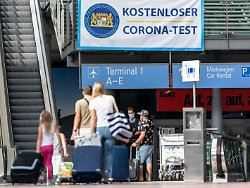The corona crisis caused the number of passengers to collapse. At Munich Airport, only 10,000 passengers are handled each day. A quick improvement is not in sight – and costs are still incurred. In the Bavarian capital, a terminal is now being sent into hibernation.
Munich Airport is suspending passenger handling in Terminal 1 until further notice. Due to the worldwide travel restrictions and quarantine rules, the airlines would have further reduced their offers in Munich with the start of the winter flight schedule, said a spokesman. In November of last year 120,000 passengers were handled per day, now there are only 10,000 – "unfortunately the trend is falling". On average, only 130 passenger planes took off and landed each day. From December 1st, all arrivals and departures will be processed in Terminal 2.
The airports in Germany urgently need money. Otherwise the lights threatened to go out in many locations, warned participants at the air traffic summit in early November. The corona crisis caused the number of passengers to collapse, and there is no rapid improvement in sight. The airports have little income, but have to pay ongoing operating costs. But there is turmoil about a government rescue package of one billion euros. Federal Transport Minister Andreas Scheuer was unable to give the industry a firm commitment from the federal government at the digital conference on November 6th. The final declaration states that the federal and state governments want to look for financial solutions over the next two weeks. Before the summit, Scheuer had asked for a rescue package of one billion euros.
Finally, he then proposed a 50:50 model: half the responsibility should lie with the states and municipalities in which airports are located, and 50 percent with the federal government. Finance Minister Olaf Scholz let the CSU politician show up first. A spokesman said with a view to the airports it is important to the finance ministry that the owners are responsible. This also applies to the federal government where it is the owner. The federal government is involved in the airports in Berlin, Cologne-Bonn and Munich.
In view of the high costs for the federal government in the corona pandemic, Scholz apparently wants to wait and see whether and how far the states move – after all, together with neighboring communities, they own most of the airports. However, the state finance ministers and municipalities are financially not bedded on roses in Corona times. The statements so far have been correspondingly cautious.
Airports want to get reimbursement of reservation costs
In any case, the industry tried everything to make the drama of the situation clear. The industry association BDL sees at least 60,000 of the 260,000 direct jobs at risk. Many of its members struggled to survive, reported Stefan Schulte, President of the Airport Association ADV. In principle, Germany is organized on a decentralized and federal basis, so it needs comprehensive airports and broadband cables. The corresponding structure must be maintained and financed.
In a first step, the airports demand reimbursement of the so-called reserve costs from the first shutdown period from March to June. It cost 740 million euros to keep the airports open for supply flights at the request of politicians, the ADV calculates. There is currently a factual second shutdown, so that medium-term cost reductions must also be achieved.
.
